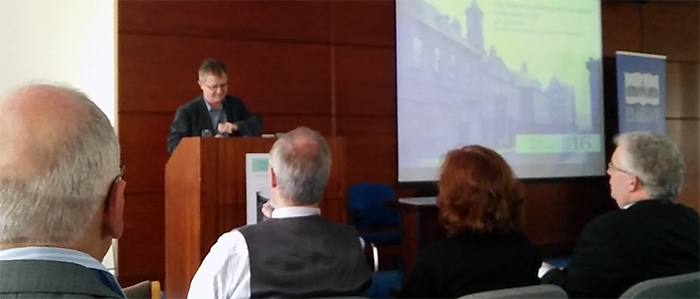 In what appears to be a second Trinity-flavoured posting, I share my thoughts on a provocative talk and session at Dr Steeven’s Hospital this noontime.
In what appears to be a second Trinity-flavoured posting, I share my thoughts on a provocative talk and session at Dr Steeven’s Hospital this noontime.Dr Steeven’s in conjunction with the Edward Worth Library invited Prof Eunan O’Halpin of TCD History to speak to their 1916 commemoration programme. His talk: ‘Cherishing All the Nation’s Children Equally: Civilian Deaths in 1916’ entertained and elicited though beyond his specific subject matter. I can only characterise his presentation as ribald, off the cuff, passionate and directly speaking to the humanity of knowledge.
A gracious welcome from Dr Tony O’Brien, DG of the HSE, inspired Prof O’Halpin to find a particular voice and make a plea for greater respect for data and sharing of knowledge —> data for the societal value that it offers to the nation and to the dead generations. Ironically, or perhaps not, this came on the day following the completion of the National census for 2016 and expressed critical concern for the lack of respect for society currently being demonstrated by lack of access and even more critically in the destruction of records – under the ambit of ensuring privacy.
Prof O’Halpin is a widely and rightly respected academic and researcher who skilfully demonstrates his craft and unique ability to use primary and official records to illuminate and inform learning. His plea for data curation resonated and reminds us of this critical need to maintain and mine social data for wisdom to guide future generations. His appeal for greater – or even continued- access to records being recklessly torn from our use were directly aimed at the office of the Data Commissioner – likening a mission of national data depredation and its damage to the Irish Nation as potentially more devastating than the actions of General Sir John Maxwell in 1916!
Invective aside – and even a spilled glass of water failed to quench O’Halpin’s impassioned delivery – the talk itself was brilliantly delivered and concluded with a beautiful rendition of The Foggy Dew by Gerry O’Reilly. The song was especially thoughtful in light of O’Halpin’s discussion and invited the audience to find new and deeper meaning in the lyrics.
Prof O’Halpin painted a picture of a city held hostage at Easter in 1916 amidst the conflicting and violent agendas of warring parties. However, it was the element of assuming responsibility for the impact of this choices that grounded his reflection. The mass of the people of Dublin were deprived of choices and at least 255 of them paid with their lives caught in a dangerous crossfire. The provocation of this talk sought to explore these civilian deaths in 1916 in an attempt to contextualise the circumstances of rebellion from their perspectives.
Although identifying isolated sectarian overtones ultimately most deaths of civilians in 1916 were largely indiscriminate concluded O’Halpin. However, he does not easily let this off without emphasising that these fatalities were far from accidental or that there was clear responsibility that was left unassumed.
“Why do you choose to stage a rebellion in a densely populated urban core that is both strategically militarily unviable and clearly increases the likelihood of indiscriminate killing?” He asked. “You are either culpable of attempting to incite greater bloodshed (innocent or otherwise) or you are not competent to accept the the responsibility for such choices.” Whether it is in the use of artillery by the British forces or the shelling by the Helga or the choice of the GPO or buildings adjunct to hospitals – there is guilt on the heads and the blood of innocents on the hands of those who acted as they did.
The Foggy Dew resonated all the more poignantly following the talk and one could not help but ponder the words and wonder whether they truly reflect the minds and souls of the citizens of Dublin who became unwilling hostages to fortune in 1916???
